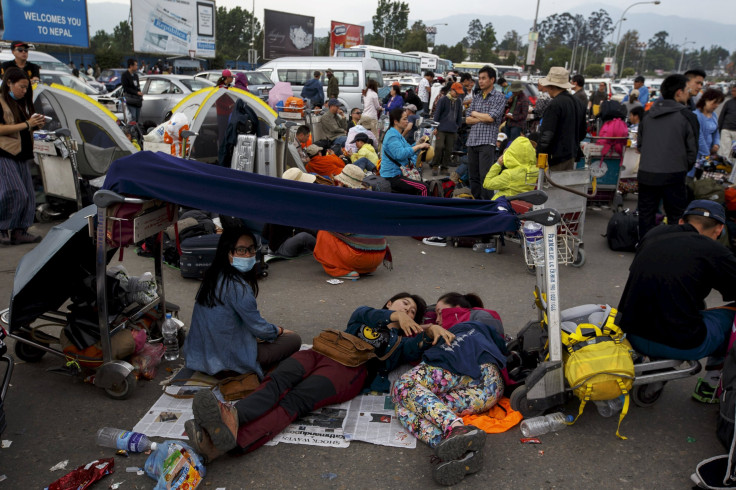Nepal Earthquake Survivors, Relief Workers Jam Airports As Ticket Prices Fluctuate

Saturday's 7.8-magnitude earthquake rocked nearly all of Nepal -- including its airports. Thousands of people were trying to escape the crisis-stricken nation and the aftershocks Sunday at the same time relief workers and medical supplies were flooding in. Some airlines raised and lowered ticket prices to deal with demand while others forced passengers to wait for a chance to fly out.
“It was complete chaos at the airport,” Emilie-Anne Leroux told the Star, adding there was “a three-kilometer queue of Indians who are standing literally nose to the back of the head” hoping to score seats. Leroux, a Canadian, said she couldn’t get a flight out of Nepal for at least a week.
Tribhuvan International Airport was closed on and off Saturday and Sunday due to the earthquake, aftershocks and heavy rainfall. Countries like the United States, Israel, Pakistan, Sri Lanka and Canada were flying in relief workers and supplies while visitors and locals scrambled to exit.
‘Chaos’ at Nepal airport, says Montreal woman stranded by massive earthquake http://t.co/8Zt47TCmTd pic.twitter.com/NxFqWsmN7e
- Global Calgary (@GlobalCalgary) April 26, 20158:20am - MT @RPOBB: About 200 members of a Japanese rescue team checking in at Suvarnabhumi airport. Next stop Nepal pic.twitter.com/P8jgsPUCiO
- Richard Barrow (@RichardBarrow) April 27, 2015The South China Morning Post reported 1,000 Chinese tourists left Kathmandu Sunday alone, requiring China Southern Airlines to send an extra plane. But some people couldn’t afford to leave. "Some airlines have lifted the price of a ticket to 13,000 yuan [about $2,100]. Cashing in on another country's disaster seriously tarnishes our national image," embassy military attache Liu Xiaoguang said.
Hundreds of Chinese tourists are currently stuck at Nepal's airport. Water is scarce, cell phones don't work. pic.twitter.com/zCDQZYiqO3
- edde (@Edourdoo) April 25, 2015#NepalEarthquake Tribhuvan Int. Arprt #Kathmandu closed 4 operations flights diverted but run way n safe condition pic.twitter.com/tAQ2n3OB2Q
- Rajesh Shenoy (@ranjalrajesh) April 25, 2015Several airlines, including Fly Dubai, suspended flights to Kathmandu through Monday, but Air India created more options. It ordered two extra planes in and out of Kathmandu Sunday in addition to carrying relief supplies for free, Mid-Day reported.
Air India, as well as SpiceJet, adopted relaxed cancellation policies that allow for full refunds through May 2. Both companies told First Post they were investigating the possibility of adding extra flights just for relief workers.
Israel's Ben Gurion Airport is packed with hundreds of Israeli soldiers on their way to help #Nepal #NepalQuakeRelief pic.twitter.com/TyKpNSM1j0
- On Elpeleg (@onelpeleg) April 26, 2015SERVE ON rescue team now at airport waiting for departure to Nepal #USAR #NepalEarthquake #NepalQuake pic.twitter.com/qmokizHFJg
— SERVE ON (@SERVE_ON) April 26, 2015“We will accommodate as many people [as possible],” Indian Foreign Secretary S. Jaishankar told First Post. “But this will take a little bit of time.”
© Copyright IBTimes 2024. All rights reserved.












